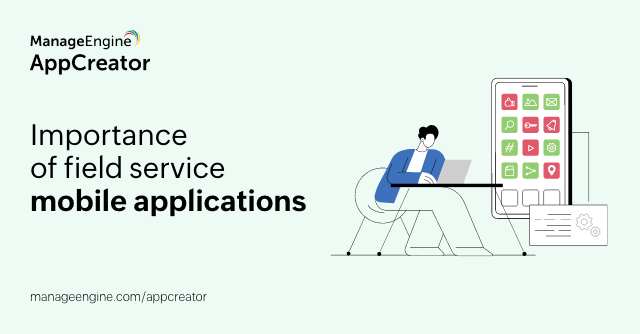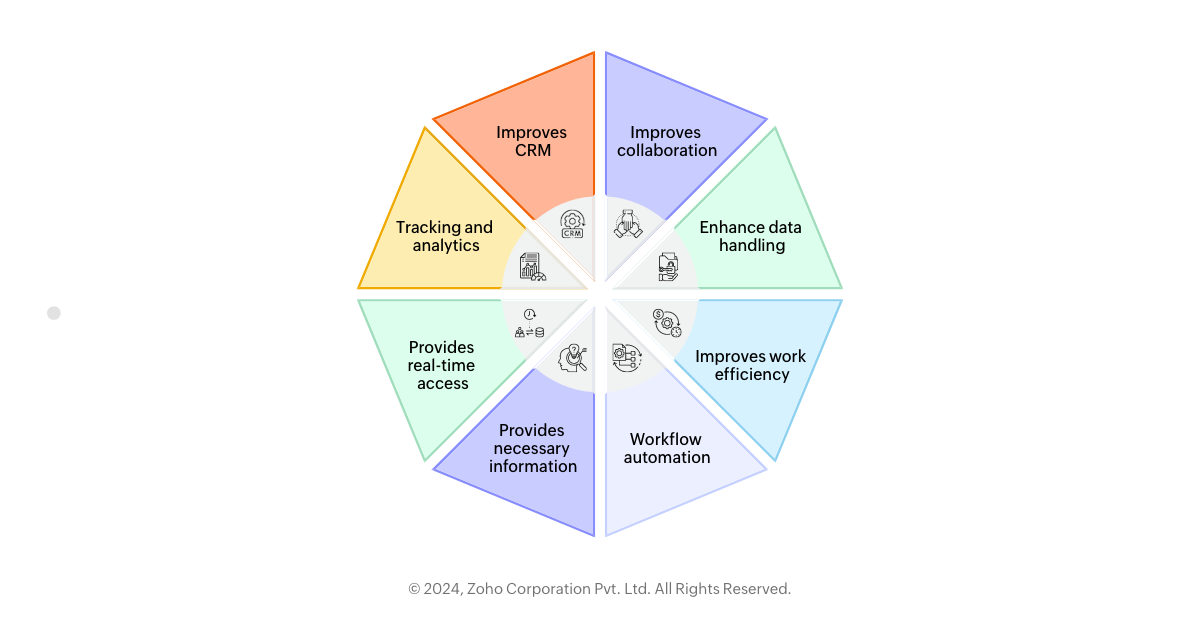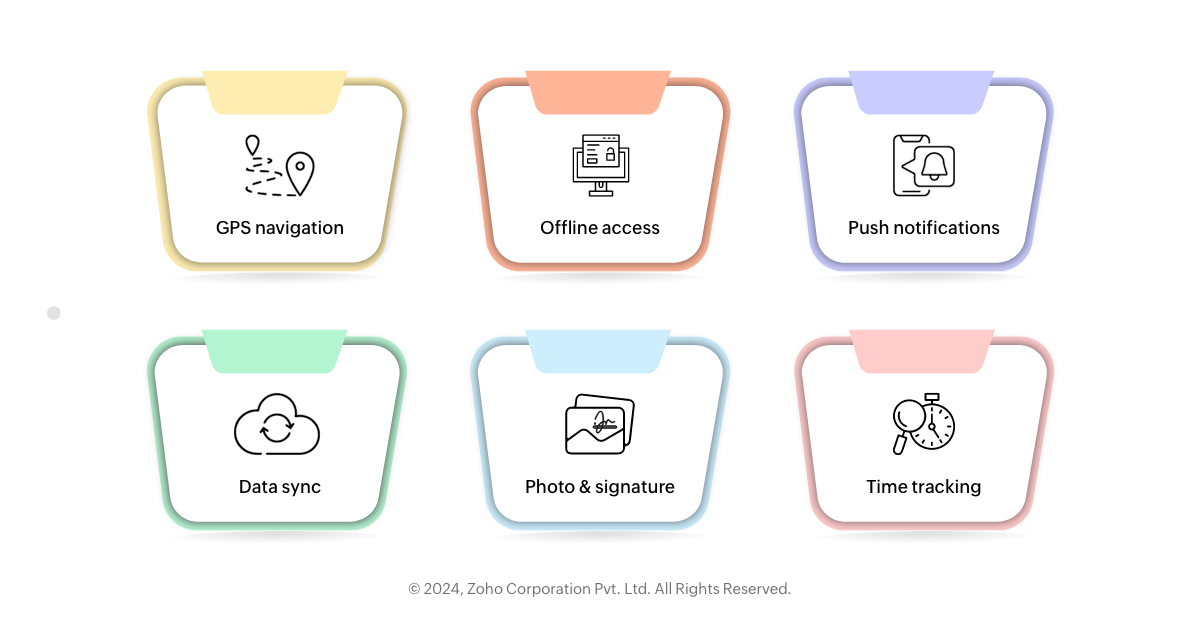- HOME
- Digital Transformation
- Importance of field service mobile applications
Importance of field service mobile applications
- Last Updated: September 21, 2024
- 468 Views
- 6 Min Read

Picture this: A food delivery partner is travelling to the customer's place with the ordered food. Before leaving, he checked all the customer details on the restaurant’s system and confirmed the route.
While en route, traffic causes unexpected delays. Instead of returning to the restaurant to inform the customer, he can simply update the status through the mobile app. This is exactly why mobile applications are a priority during a field service.
What is a field service mobile application?
A field service mobile application is a software tool designed to help technicians and service workers perform their tasks more efficiently while out in the field.
It provides them with easy access to job details, allows them to record their work, get directions to their next location, and communicate with their team remotely. Essentially, it streamlines the work process for field service professionals, ensuring they have everything they need at their fingertips.
Why use mobile apps in field service management
Using mobile apps in field service management is advantageous for a few good reasons.
If you’re a technician out on a job—without a mobile app, you’d be juggling paper forms, making phone calls, and trying to remember everything you need. It can get pretty messy!
Mobile apps simplify all of this. They keep things organized and help you stay efficient, saving time and reducing mistakes.
Benefits of mobile apps in field service
Let’s take a closer look at how mobile apps can benefit field service management:

1. Improves customer relationship management
Field service mobile apps help improve customer relationships by giving workers instant access to customer details and job histories.
For example, if a technician is called to fix the water heater, they can pull up the customer’s past service records on their phone. This helps them provide more personalized service and leads to happier customers.
2. Improves collaboration
Mobile apps make it easier for field workers and office staff to collaborate.
For example, if a technician runs into an unexpected problem, they can quickly send a message through the app. The office team can then provide guidance or send additional resources if needed. This real-time communication helps solve problems faster and keeps everyone aligned.
3. Enhance data handling
Digital records are way easier to manage than the paper ones. Mobile apps allow field workers to store and access data efficiently.
For instance, if a technician needs to record the parts used during a repair, they can do so on the app. This information is immediately updated in the system, reducing the risk of errors and lost data. Essentially, apps streamline the way data is captured and documented, making record-keeping more accurate.
4. Improves work efficiency
With all the necessary tools and information available on their mobile devices, field workers can complete tasks more quickly and accurately.
For example, if a delivery driver has access to real-time traffic updates and optimized routes through the app, they can avoid delays and get the job done faster.
5. Automating workflows
Mobile apps can handle a lot of the routine stuff, like scheduling, invoicing, and reporting, so you don’t have to. This cuts down on manual work and the chances of messing up.
For example, an app can automatically whip up an invoice after a job is done and send it off to the customer, making billing as smooth as it could be.
6. Empower technicians with necessary information
Field workers need the right info at their fingertips to do a good job. Mobile apps give them everything they need, from job details to customer preferences.
Picture a technician fixing a machine—they can pull up the manual or troubleshooting guide on the app, making the repair quicker and easier.
7. Real-time access to data
One of the coolest things about mobile apps is having real-time data access, which keeps communication and operational updates flowing seamlessly. Field workers can update job statuses, jot down issues, and track progress on the spot. This immediate communication ensures that the office team is always in the loop.
For instance, if a repair wraps up early, the technician can update the status right away, helping to schedule the next job without a hitch, which reduces the wait time between two jobs and increases the overall productivity of the field service technician.
8. Tracking & analytics
Mobile apps with tracking and analytics tools let managers keep an eye on how things are going. You can see how long different jobs take, which employees are performing exceptionally well, and where there might be room for improvement. This data helps in making smarter decisions and fine-tuning how field service runs.
Mobile app features for enhanced field service management
Field service apps are packed with features to make things easier. Here are some of the key ones:

1. GPS navigation
GPS navigation helps field workers find the quickest routes, dodging traffic and delays. If a technician has multiple stops in a day, the app can map out the best route to get them to each site on time.
2. Offline access
Offline access is a lifesaver when there’s no internet. Field workers can still check and update job details, even in spots with lousy coverage. For example, if a technician is working in a remote area, they can still do their job and sync everything up once they’re back online.
3. Push notifications
Push notifications keep field workers in the loop with important updates and reminders. So, if there’s a schedule change or a new job comes up, the app sends a notification to the technician’s phone, making sure they don’t miss a beat.
4. Data sync
Data sync ensures that any info entered into the app is updated everywhere, instantly. This means any changes or updates made by field workers show up right away in the central system, keeping everyone on the same page.
5. Photo and signature capture
Photo and signature capture allows field workers to take pictures of their work or get a customer’s signature directly through the app. For instance, a technician can snap a photo of a completed job or collect a digital signature from the customer, all within the app. This feature helps document work and speeds up approval processes.
6. Time tracking
Time tracking lets field workers log their hours and track the time spent on each job. This makes it easier to calculate billable hours and ensures accurate payroll. Plus, managers can see how time is being used and identify areas where efficiency can be improved.
How ManageEngine AppCreator can help in creating your field service mobile app
When it comes to developing field service mobile applications, there are a few options available:
Apps built from scratch by developers: These are fully customized applications created by dedicated developers. While they offer complete control over the design and functionality, they can be time-consuming and expensive to build and maintain, especially for businesses that don’t have an in-house development team.
Off-the-shelf apps: These are ready-made solutions that can be used right out of the box. Although they are quick to implement, their main drawback is the lack of customization. Businesses often have to adapt their processes to fit the app, which may not fully meet specific operational needs.
Apps built on low-code platforms: Low-code platforms offer a middle ground, allowing businesses to quickly build customized applications without the need for extensive coding knowledge. This method combines ease of use with the flexibility to tailor apps to specific field service management requirements.
Low-code refers to a development approach that uses visual tools and pre-built components to create applications with minimal hand-coding. This means you don’t need to be proficient in mobile programming languages like Swift or Java, nor do you need to know the complexities of iOS and Android development.
That’s where ManageEngine AppCreator comes in. AppCreator is a low-code platform that simplifies the process of building a field service app, making it both simple and efficient. The platform handles the technical details, allowing you to focus on designing and customizing the app’s features.
Let’s say you need features like GPS navigation, offline access, and real-time updates. With AppCreator, you can easily add these features to your app using a user-friendly interface. You don’t have to worry about coding or complex development processes. Instead, you can focus on customizing the app to fit your specific needs.
So, whether you’re a technician on the move or a manager overseeing field operations, AppCreator helps you in creating your distinguished field service app to aid your field operations.



